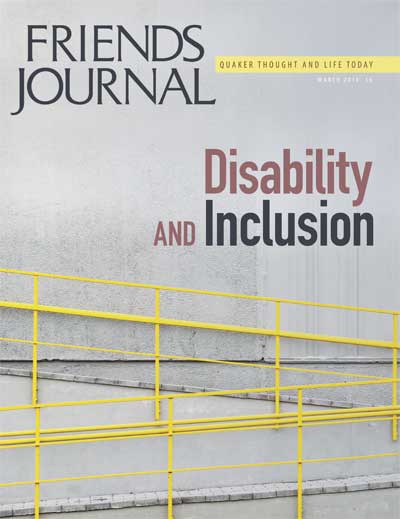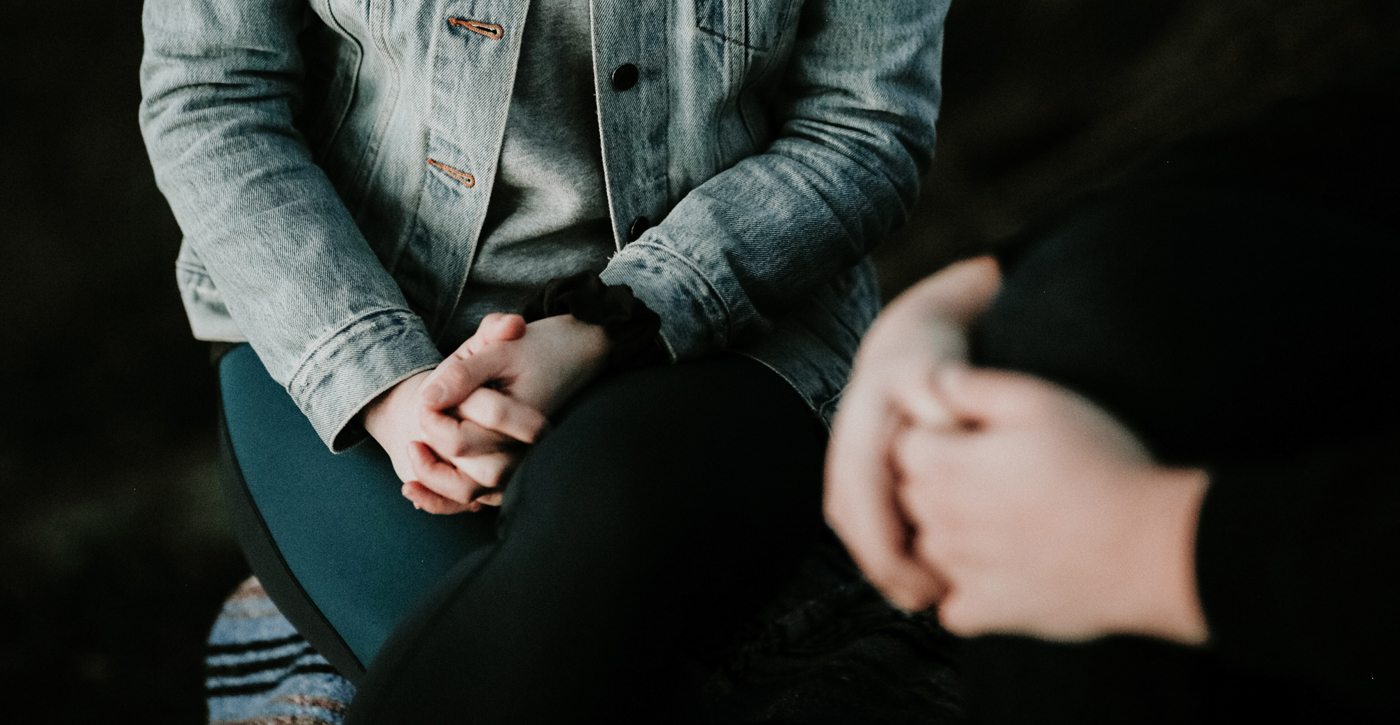
FJ PODCAST SUBSCRIPTION: ITUNES | DOWNLOAD | RSS | STITCHER
As a licensed clinical social worker, I work with people with mental health diagnoses who have long histories of institutionalization. The people I work with have experienced significant trauma, both in childhood family life and in the state hospital system that was charged to help. Stigma continues to be the norm in their lives and in our society. When I visit Friends meetings, I wonder if the people who I serve would be welcomed into fellowship as equal contributors, welcomed to receive but not contribute, or perhaps turned away at the door and/or referred to social services. To become a welcoming community, we must start by renewing our commitment to equality and diversity in a way that is sensitive to trauma.
Historically, Friends value equality and that of God in everyone. Many communities hope to be a safe place for supporting differences and vulnerability among individual members. As a social worker, I affirm mental diversity as valuable to community and not needing to be labeled, diagnosed, or treated. As communities, we not only need to accept differences and create safety, we also need to value diversity, including mental diversity, as beautiful and essential to healthy community. Many meetings have started to remove access barriers to people with disabilities. I attended one meeting where a member felt comfortable sharing about her recent psychiatric hospitalization in worship, and she was supported. I have seen boundaries groups, grief groups, and celebrate recovery groups connected to another Friends meeting. This shows me that some Friends have started moving in a supportive direction but more steps are needed.
Despite our effort to recognize “that of God in everyone,” our vision is often clouded by stigma and fear, which makes it difficult to see people as more than their disabilities and to recognize the gifts they have to contribute to community. Sometimes stigma looks like people offering to “hold someone in the Light” in a way that is not really hearing or seeing them. Other times stigma comes in the form of patronizing or “rescuing” someone, rather than recognizing their unique strengths and gifts and welcoming them as a full community member. Stigma also looks like limiting someone’s potential to participate in the life of a faith community, employment, or living situation. Stigma may look like the assumption that people with psychiatric disabilities are dangerous. It may place a diagnostic label on someone and make that their identity, seeing them as an illness and as broken.
In the social work world, there continues to be stigma that can re-traumatize people. The old medical model that many service professionals worked under in the past assumed that people were sick and pathologized mental illness. Workers asked patients, “What’s wrong with you?” People were always thought of as patients who had an illness with symptoms that only could be helped through medication and experts who did psychotherapy. People were warehoused in state hospitals and removed from communities until their only identity was that of a patient with a mental illness. These people were given labels such as “dangerous, unmotivated, helpless, hopeless, manipulative, or grandiose.” Fortunately, social workers are now encouraged and sometimes required to use trauma-informed care. Becoming a trauma-informed social worker means becoming educated and aware of how trauma affects people. We also listen to people’s stories and experiences and ask “What happened to you?” rather than “What is wrong with you?” It means seeing people as resourceful, capable, and resilient.
People who have psychiatric disabilities, including the people I serve, are not walking illnesses. There are many parts to their identity, including friend, family member, worker, volunteer, musician, artist, athlete, and more. The stigma still persists that a person who receives some kind of mental health care can only experience “therapeutic relationships” and that a faith community cannot provide the type of care a person with a psychiatric disability needs. However, people with psychiatric disabilities go to Quaker meetings for the same reasons everyone else does: human connection, community, and worship. A person should no longer have to choose between a faith community and social services. Faith communities should learn to support their members in a way that is trauma-informed and affirming of mental diversity. A religious leader might help a person connect to social services, if the person asks for it, but no one should be sent away from the church because of a mental health issue. Social service workers should also support people in connection to the spiritual community of their choosing by helping the individual identify and articulate any access barriers that need removal or adjustment.
Fortunately, there is a way forward that allows for all individuals with mental health related disabilities to be fully included by developing trauma-informed communities. The first step to becoming more trauma-informed is to recognize trauma. Trauma is a nearly universal experience. Trauma can affect people of every race, ethnicity, age, sexual orientation, gender, psychosocial background, and geographic region. People experience trauma when they are exposed to serious stress such as loss of employment, abuse, divorce, mental health concerns, witnessing or being the victim of violence. When people who are traumatized perceive a threat to themselves or their well-being, they often lose the ability to stay centered. Trauma often creates a fight-or-flight response, which is essential to human survival. Some common effects of chronic trauma are fear, guilt and shame, loss of trust, and a lessened ability to tolerate stress.
People who have experienced trauma can have many access barriers to faith communities that we must all work together to remove and overcome. People are sometimes judged as being bad or dangerous for having a different perception of the world caused by trauma. A person may not feel safe to walk to a meetinghouse at night or to travel on crowded buses or busy streets. A person may experience a flashback on the way to meeting or during worship that could prevent staying or getting to a meeting. A person could see someone who brings an abuser to mind and causes a reliving of previous abuse. A date or season could be an anniversary for an especially difficult loss or traumatic event. Offering platitudes, not giving someone space to feel difficult emotions, and sharing unsolicited advice can also lead to more alienation and frustration. A person who has been in crisis has a lot of shame and fear of judgment when coming back to a community that has seen them in crisis. Along with recognizing trauma and removing access barriers, a trauma-informed community would promote resilience and work to mitigate further trauma.
A trauma-informed community recognizes that many people have experienced trauma and welcomes these people as full community members. People have the capacity for healing at their own pace and in their own way. Sometimes people with psychiatric diagnoses have setbacks, as we all do in life. They can continue to heal, moving forward in ministry and full community life. A trauma-informed community would hold hope and recognize resilience. The community would be a safe place to talk about hurts, habits, and hang-ups. Community members who perceive things differently from the majority would not be judged as bad or dangerous. All community members would be treated with respect. There would be room for people to cry during worship or take time away from a responsibility, and be welcomed back. Expectations in worship could be flexible: perhaps someone does need to write during worship or have access to a phone for use as an assisting device.
Personal space can be a major consideration for those who have experienced trauma. Making sure people have a clear exit and do not feel trapped, as well as not pressuring people to hug or hold hands could help people feel more comfortable. In a trauma-informed community, a person’s identity would not be defined by their psychiatric disability. A person would not be judged or defined by their actions in moments of crisis. Instead, if crisis occurred within the community, the whole community would go through debriefing and restorative justice so that the community could heal. In a trauma-informed community, we could provide an emotional outlet for healing through worship in music, art, dance, etc. People who have experienced trauma would be welcome to serve on committees and supported in calls to church leadership. We have an opportunity to learn from the resilience of Friends who have been traumatized and who embrace different views of the world.
As community members and friends of those who have experienced trauma, we need to work to provide a safe environment that recognizes the prevalence and signs of trauma and supports the potential for healing, instead of re-traumatizing people. Isolation and fear can compound trauma, but community, safety, and hope can bring restoration. We need to work to reduce fear, question stereotypes, overcome isolation, forgive, resolve hurts, and move forward together.
Imagine a meeting where we practice our testimonies of equality and social justice, where people are valued and empowered to share gifts, and where we work together to break down stigma that so many of us are facing. Imagine a meeting that is safe for people to share vulnerabilities without fear of being judged or “rescued.” Imagine a place of trust where we all have a voice in decision making and those who feel broken are able to share from the Light and wisdom within. Imagine a meeting where individual culture, gender, and history is honored, and where people who have experienced trauma will learn that they are not alone.
This is our call as Friends of Jesus and friends of those who have experienced trauma. Together, we can all work to break down stigma and fear, inspire hope, help people heal from trauma, and grow in our faith from seeing and experiencing resilience and healing.






Comments on Friendsjournal.org may be used in the Forum of the print magazine and may be edited for length and clarity.